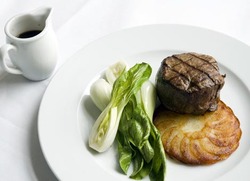If you fancy a diet which lets you have a delicious blend of Eastern and Western cuisine, then the Okinawa Diet may be a suitable fit for you. Originating from a country where people usually live up to well over a hundred years old, this diet primarily focuses on it’s healthy weight management principle of calorie density.
Hara Hachi Bu
Followers of the Okinawa Diet live by the japanese saying Hara Hachi Bu, which in English means eat until you are 80% full, in practice of the belief that the stomach’s stretch receptors take about 20 minutes to tell how the body full it already is.
Okinawa 4 Food Categories
Slimmers practicing the Okinawa Diet traditionally put much emphasis on consuming nutrient-rich, low-calorie foods such as vegetables, whole grains, legumes, soy and fish with limited amounts of lean meats. The Diet calls for dividing food into 4 categories based on calorie density, namely:
1. The Featherweights– Foods with a caloric density of less than 0.7, and includes yogurt, tofu, most veggies and fruits. These foods can be eaten freely and without limit.
2. The Lightweights- Foods weighing in a calorie dansity between 0.8 to 1.5, which one should eat in moderation and includes white fish, cooked grains such as rice and pasta.
3. The Middleweights- Foods with a calorie density of 1.6 to 3.0 such as red, fatty fish, whole-wheat, soy cheese and raisins. These should be eaten while monitoring portion size.
4. The Heavyweights- These foods have a calorie denisty of more than 3.0, and should be eaten sparingly. These include foods high in fat and sugar with low water and fiber content. Many foods belonging to this category are processed and refined.
The Skinny
The low-calorie Okinawa Diet has the main advantage of letting one eat relatively little while having the sense of satiety because of it’s fiber-packed food selections. Exercise is also encouraged in the program to burn the calories eaten. As time goes by and the body adapts to the Okinawa Diet, the body will no longer store many calories as fat and will stop craving for the non-nutritious foods it once was used to. Because this diet stresses the importance of smaller portions and is very low-calorie, it is always best to consult a doctor before cutting the calorie intake drastically.


February 19, 2011
Diets & Nutrition